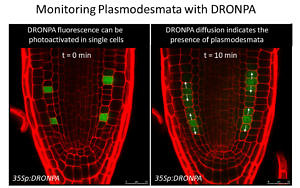RG PD Dr. Ruth Stadler
Research
Transport processes are essential not only for animals. Higher plants use their vascular system to distribute assimilates and signalling molecules between organs. Long distance transport mediate carbohydrate delivery to sink organs like roots and flowers that have their functional focus on other processes than photosynthesis. The exchange of signalling molecules via the vascular system is important for basic processes in plants like a coordinated development and a regulated response on external factors.
We are studying various transport processes, including long distance transport in the phloem, and carrier-mediated transport of sugars through the plasma membrane as well as cell-to-cell transport of solutes through plasmodesmata. We use symplastic fluorescent dyes and fluorescent proteins to monitor passive cell-to-cell transport at the confocal lasermicroscope. We are studying the presence of plasmodesmata that connect the cytoplasm of adjacent cells and allow solutes and proteins to diffuse into adjacent cells. We are interested in the pathway of phloem unloading in sink organs. This pathway can occur symplastically as it is known for root tips where the cells are connected by plasmodesmata with the conducting sieve elements. The pathway can occur apoplastically as in the developing embryo and in pollen tubes that aren’t connected by plasmodesmata to adjacent cells and need to take up nutrients during their growth.
Nutrient delivery is a central issue also for seed filling and for the growth of storage organs. Knowledge of the presence and the regulation of plasmodesmata and of transport proteins can be fundamental for approaches to improve crop plants.
